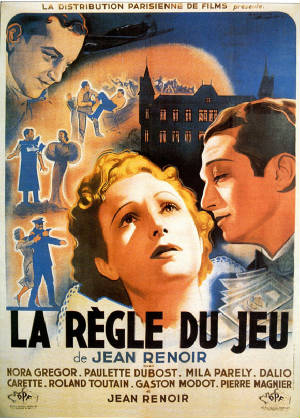|

(1939, directed by Jean Renoir)
- inducted 2013 -
"Movies both good and bad have always sent out ripples which have caused the surface
waters of cinema history to undulate and swoon and reflect their influence, however undue, benign, creative or destructive.
The waves generated and felt by truly great movies, on the other hand, shift the contours of the surface, all right, but their
real influence can be almost subterranean, affecting not only the way movies in their wake look and sound and feel, but also
how the sensibilities at the heart of their creation can speak across oceans and generations.
"When Jean Renoir’s Le regle de jeu (The Rules of the Game) was conceived, written and filmed, in a span
between 1938 and 1939, France was a country torn in its political tolerance and responses to cataclysmic events on the European
front that made the looming shadow of Hitler’s rise to power and influence ever harder to ignore. Renoir’s film,
a comic roundelay of marital discord, class-generated disdain and general societal distraction decorated with a patina of
good manners and brittle loyalties, sought to engage with its audience in a paradoxically airy manner, to diagnose and autopsy
the corrosively blithe ignorance the director saw at the heart of the country’s, and indeed Europe’s, collective
self-deception with a sort of romantic sleight of hand. (Renoir once famously characterized the movie as a portrait of a complex
society dancing on a volcano.)
"Renoir cast himself as the would-be fool, Octave, a caustic but affable bear of a man (quite literally a bear, at one point)
whose allegiances to the various players in an ostensibly breezy farce of adultery, the sophistication of which becomes ever
more apparently feigned and insincere, are almost immediately tested. (His friend LeChesnaye, lord of the manor, sees him,
at least initially, less a fool than a dangerous poet.) Octave’s empathy-- 'Everyone has their reasons'-- extends not
only to his wealthy hosts, who have invited each other’s lovers, Genevieve, a bored society wife and Andre, a famous
(and famously lovelorn) aviator, along with several other friends to a weekend of frivolity at their country estate. He also
shares the hearts of various members of the mansion’s staff, and the confusion of those empathies will fuel the tragedy
at the heart of Renoir’s liltingly critical vision of cultural decadence and casual brutality. The film’s famous
pheasant hunting sequence may be even more difficult to watch today than it was in 1939, but some of the sympathetic conversation
in The Rules of the Game is similarly cutting. When LeChesnaye’s wife Christine discovers that her husband’s
own betrayal, which has gone far more effectively hidden than the one she has rather openly cultivated with the aviator, it
is Octave who justifies the deception by associating it with the general behavior of the times. 'Everyone lies,' he tells
her, 'pharmaceutical fliers, government, newspapers, the cinema. So why shouldn’t simple people like us lie as well?'
"Reviled upon its release, Renoir’s movie can be felt in everything from the tacky violence of Larry Peerce’s
The Sporting Club (1970), based on a Thomas McGuane novel, to Alan Bridges’ The Shooting Party (1985),
to intimate epics of television drama like Upstairs Downstairs and Downton Abbey and, of course, features like
Gosford Park, written by Downton Abbey creator Julian Fellowes. (One could go even further and suggest that
the career of Robert Altman, director of Gosford Park, might not exist in quite the same way without the encouraging
influence of Renoir stretching to inspire his own.) But what’s most striking about watching The Rules of the Game
in 2013, what cements its stature as a truly great movie, is the degree to which its political and interpersonal acuity seem,
aside from its period specifics, simultaneously of its time and also utterly contemporary. This 1939 film, made in the darkening
path of perhaps the greatest evil the world has ever seen, can connect to contemporary audiences in surprisingly painful and
biting ways. The sense of global malaise, isolation and insecurity—some of it inspired by technology of which Renoir
could never have dreamed— which is a hallmark of our own very modern self-deceptions and distractions is effortlessly
accessed here, making Renoir’s marvelously deft and witty movie seem as pertinent, and as impertinent, as it ever was."
~ Dennis Cozzalio
Original title: La règle de jeu
Principal cast: Nora Grégor, Paulette Dubost, Mila Parély, Odette Talazac, Claire Gérard, Anne Mayen, Lise Êlina, Dalio, Carette,
Roland Toutain, Gaston Modot, Jean Renoir, Pierre Magnier, Eddy Debray, Pierre Nay, Francoeur, Léon Larive
Screenplay by Jean Renoir, in collaboration with Carl Koch
Director of photography: Alphen, Bachelet, Jacques Lemare, Alain Renoir
Production design by Douy and Lourié
Costume design by La Maison Chanel
Film editing by Mme. Huguet and Marguerite
Original music by Joseph Kosma
Sound engineer: De Bretagne
Produced by Jean Renoir (uncredited)
France
Duration: 110 minutes
Languages: French
Filmed in black and white
Sound mix: Mono (Western Electric)
Aspect ratio: 1.37:1
Produced by Nouvelles Êditions de Films (NEF)
Released in USA by Cine Classics
Premiered in Paris, France on 7 July 1939
USA release date: 8 April 1950
Awards and honors:
- Selected as one of Roger Ebert’s “Great Movies,” 29 February 2004
|

